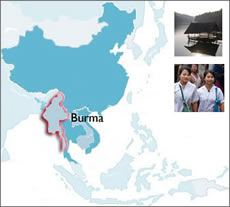Burma
BACKGROUND
While the U.S. does not have a bilateral relationship with the Government of Burma (GOB) (Myanmar), USAID promotes responsive governance and provides humanitarian assistance to Burmese internally displaced persons (IDPs), migrants, and refugees in the 10 Thai provinces along the Thailand-Burma border. USAID also supports the UN to work with the GOB to prevent outbreaks of avian influenza. The problems of human rights, poverty, inadequate education and limited health care within Burma’s borders remain dire. These conditions were greatly exacerbated by Cyclone Nargis which struck in early 2008. As of June 12, 2008 USAID had provided more than $31.4 million in disaster relief to the people of Burma in addition to its regular program funds.
Although multi-party elections in 1990 resulted in a decisive victory for the main opposition party, the military junta continues to maintain political and military control in Burma. Under the current regime, social and economic conditions have deteriorated significantly. This has driven many Burmese to relocate along the Thailand-Burma border. Consequently, approximately 150,000 Burmese refugees and over 1 million migrants now live in Thailand. Prior to Cyclone Nargis, it was estimated that 500,000 Burmese were displaced within eastern Burma. The numbers of refugees and IDPs are expected to increase as a result of the disaster; however it is too early to predict the long-term effects of the storm. U.S. Government policies continue to encourage the Burmese government to engage in constructive dialogue with the democratic opposition with the ultimate goal of national reconciliation.
USAID PROGRAMS
INVESTING IN PEOPLE: HEALTH AND
ENVIRONMENT
Health programs along the Thailand-Burma border provide basic medical care to IDPs, migrants, and refugees within and outside refugee camps. They emphasize preventative and curative healthcare and give capacity-building assistance to private health organizations and clinics to provide high-quality primary health care. Within Burma, USAID supports avian influenza (AI), infectious diseases and HIV/AIDS programs. To prevent outbreaks of AI, USAID supports technical assistance and training for the GOB to develop and implement poultry and wild bird surveillance programs, strengthen laboratory capacity and prepare and equip rapid response teams. To mitigate the spread of HIV/AIDS in the country and throughout Southeast Asia, USAID focuses on HIV/AIDS prevention activities for at-risk people, behavioral research, condom marketing, care and support of people living with HIV/AIDS, and coordination with complementary programs in neighboring countries.
INVESTING IN PEOPLE: EDUCATION
USAID provides basic and higher education to IDPs and to numerous communities of migrant and displaced people living in Thailand. Higher education includes vocational and technical training, professional skills development, and increased understanding of democratic principles. USAID supports distance education and makes it possible for Burmese students to earn an Associate Degree; from Indiana University. USAID provides teacher training to English instructors working through civil society organizations in the country. It also provides material assistance to the American Center's English as a Foreign Language program.
GOVERNING JUSTLY AND DEMOCRATICALLY
USAID supports democracy-focused activities including the training of Burmese journalists and public information workers to improve the quality and availability of news and information for Burmese citizens, refugees, and exiles on the situation within Burma. Reporters and editors are trained to give accurate, unbiased accounts of issues affecting the nation. USAID helps build the capacity of local organizations so they can develop their leaders, have more control over their future, and can focus on children's rights, access to education, access to health care, and protection from abuse and exploitation.
HUMANITARIAN ASSISTANCE
USAID provides crisis and health support. It works with community-based organizations to provide medical care for IDPs in eastern Burma. USAID also has health and materials-assistance programs for migrants and refugees in Thailand. It funds mobile services and clinics in the areas of greatest need. USAID also supports dialogue with the Government of Thailand to provide legal rights and services to Burmese migrants working in Thailand.
CONTACT
Warren Harrity
Program Development Office
U.S. Agency for International Development
GPF Witthayu Tower A
93/1 Wireless Road
Bangkok 10330 Thailand
Office: (66-2) 263-7440
Fax: (66-2) 263-7499
E-mail: wharrity@usaid.gov
|

